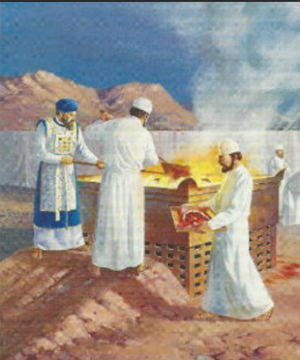Starting 2021 in Style…For Single Jeopardy…
Where Is the Center of the Bible?
By Neil Earle
If my dear departed fellow Canadian Alex Trebek asked you, “Where is the center of the Bible?” – what would you say?
Some would turn to John 3:16, “God so loved the world that He gave His only begotten Son” and, yes, that contains the kernel of much that is central. The rest of the verse says “whoever believes” and this has almost become the key article of the faith – our belief.
But is that where the center lies?
 Luther: Troubled monk/Apostle of Faith.
Luther: Troubled monk/Apostle of Faith.Two Extremes
There are two errors Christians fall into. One is the subtle error that creeps in that salvation begins with us – the things we must do, pray, go to church, do good, keeping certain ordinances or “beefing up our faith.” The other error is that we do nothing at all – God does it all for us, there’s nothing to do, grace means we sit back and enjoy the ride. This is anti-nomianism (Greek = nomos = law). This violates clear NT commands to “strive,” “make every effort,” “press toward the mark.”
The monk and Bible teacher Martin Luther labored over this very dilemma. His learned superiors advised him, “Do the best you can and trust Mother Church.” But somehow Luther felt something vital was missing. He tried to be the best monk he could be and knew inside himself that wasn’t enough.
Finally, teaching the Book of Romans, he hit upon Romans 3:21-26. When the message hit home he knew he had found the answer to his painful quest. Luther saw this passage as the center of the Bible and he later wrote he felt like the doors of paradise had opened.
Here’s what the verses say:
“But now the righteousness of God has been manifested apart from the law, although the Law and the Prophets bear witness to it – the righteousness of God through faith in Jesus Christ for all who believe…for all have sinned…and are justified by his grace as a gift through the redemption that is in Christ Jesus” (Romans 3:21-24).
 Paul had a tough audience in Rome but rose to the occasion.
Paul had a tough audience in Rome but rose to the occasion.Price of Admission – Paid in Full
Here we meet such grand Biblical terms as “justification,” “redemption” and especially the word “grace.” But what does all that mean?
Remember, Paul is writing Romans to the people who had conquered the world and imposed law and order on the nations. The Romans grooved on terms such as “iusticia” – “justice” and “law and order.” They had no time for a namby pamby God who would let criminals walk away free.
But there were many Jewish believers in Rome also (2:17) and Paul knew that to them “righteousness” meant a strict adherence to the 613 demands of their Torah. They were not about to feel God would compromise with his Law by a universal undeserved pardon.
In this wonderful passage Luther saw how Paul spoke to both audiences – the Roman sense that God must be Just and cannot overlook law-breaking and the Jewish sense of the need for some kind of atoning sacrifice based on hundreds of years offering bulls and lambs to God.
 The Jewish dedication in sacrifice reached its climax in Christ’s work.
The Jewish dedication in sacrifice reached its climax in Christ’s work.Something New has entered History
In Romans 3:25 Paul describes Jesus as the “propitiation” for our sins. Some translators and scholars today do not like the word “propitiate.” It smacks too much of an offended deity who needs to be appeased like the Tom Hanks movie “Joe and the Volcano” whereby Joe agrees to be paid money to be thrown into the volcano because he has an incurable disease anyway. But most expositors stick with “propitiation” both because of its tie to the OT Mercy Seat/Atonement ceremony and because words like “expiation” seem too mechanical for the action God undertook in sending his Son and for Jesus accepting the responsibility.
So Paul’s Gospel has something new for Roman and Jew.
Let’s read those wonderful words again. “But now the righteousness of God apart from law is revealed, being witnessed by the law and the prophets.” Paul knows the Law is not the problem, Luther felt the Law was wonderful for showing us what to avoid. But Paul’s theme was that a new principle has entered history in the presence of Jesus Christ. This new teaching is justification by faith (verse 22). But not any kind of faith. It has to be faith in the shed blood of Jesus (verse 25).
God’s Grace extended to us depends on the “redemption that is in Christ Jesus.” It depends more upon God, that is, than it does upon us. When we forget that we minimize the importance of Jesus rising from the dead to symbolically present His blood sacrifice as an atonement for our sins (Hebrews 10:12).
This is why Jesus is called “the propitiation” in Romans 3:25 and that action is spelled out more in Hebrews 9:11-12. “By his blood through faith” becomes the new emphasis for the Jew. For the Roman God “demonstrates His righteousness” be removing by Himself the penalty for sin. That penalty was paid in full by His son. The willing sacrifice of God himself means more to the divine justice than all the sins we commit both past and “at the present time.” This makes God Just and the Justifier of the one who has faith in Jesus (v. 26).
Theologians call this the “dark mystery” of atonement because it satisfies both the requirements of the Law and abolishes its sway over us as an instrument of our condemnation.
The Just One is the Justifier
Let’s now summarize what we’ve been seeing in this central text:
- The Law is not the problem but…the Law does get in its own way (C.K. Barrett). Its function is to condemn and convict but…with the cross a new principle has entered history.
- We don’t see “Grace” as an abstract principle but as a way to live from now on. By penetrating to the Source of Grace – the Blood of Christ – we see the price paid and live our lives as trophies of Grace and extend that Grace to others we meet.
- The Jewish sacrifices pointed to these powerful realities.
- Faith comes in because we believe in an event that happened 1900 years ago. We were not there at Calvary, yet the Sacrifice made covers all sins past, present and future. The Cross, the Atonement, the Propitiation is God’s answer to the questions of sin, death and suffering. Death still reigns – consider the nightly news – but it is trumped by another mightier principle, Paul and Luther’s mantra: “the Righteousness of God by Faith.”
- God is Just – this meant a lot to the Romans. But God is also the one who justifies and the debt is paid in full. The Judge has closed the file against us.
“The Deep Things of God”
Luther considered Romans 3 the center of the Bible because it shows how God in Christ has entered into our sufferings, participated with us in our pain even to death, and has given unshakeable hope to all who suffer unjustly. God’s vindication of Jesus at the Resurrection grounds Christian hope. It is as solid as the ground on which Christ’s cross stood. This is the only message that will stand the test of time.
Someone asked Joseph Campbell once why all human cultures tell stories of Heroes who come to lead people to freedom and often sacrifice themselves in the struggle. “Because,” Campbell answered, “those are the only stories worth telling.”
The Christ Story outlined in Romans 3:21-26 is indeed the Mother Lode. It is the one true story that touches on what C.S. Lewis calls the hard stuff of life and offers powerful hope to all who struggle. Those are comforting thoughts to begin 2021.